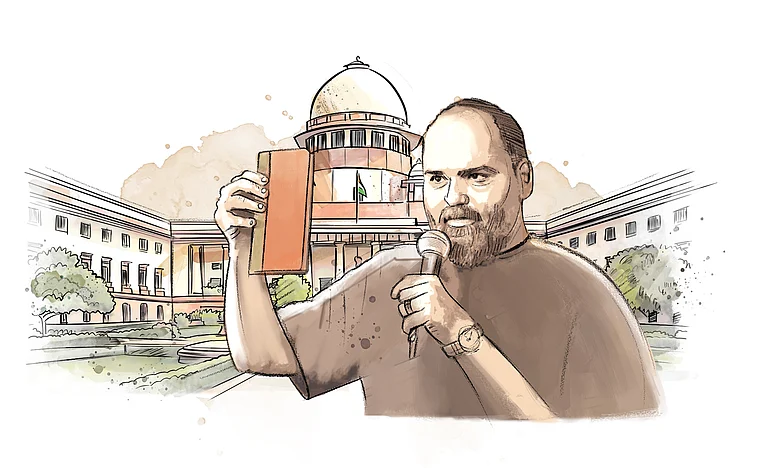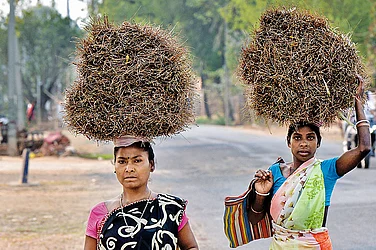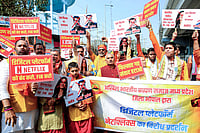In India, there has been a debate of late around the freedom of press, protected within the ambit of the fundamental right of freedom of speech and expression, enshrined in Article 19 of the Constitution. The debate has intensified especially in view of suspension of social media accounts and instances of posts being taken down on the orders of the government. On the World Press Freedom Index 2024, India ranked 159 out of 180 countries, a low for the world's biggest democracy.
Outlook looks at a few landmark cases that dealt with instances of freedom of press and freedom of free speech and expression.
Romesh Thappar vs State of Madras
A noted political commentator and communist, Romesh Thappar, who publicly criticised Nehru’s policies, published and edited a journal in English called Cross Roads. The journal was banned in the former State of Madras under Section 9 (1-A) of the Madras Maintenance of Public Order Act, 1949. Challenging this ban, Thappar filed a legal petition with the Supreme Court arguing that the powers granted under the Act limited freedom of expression as guaranteed by Article 19 of the Constitution of India. The State argued that the restriction on the journal was necessary for public safety and maintaining public order and the step was towards the state's security, a reasonable limit on freedom of expression according to Article 19(2).
The court ruled that Thappar had the right to directly approach the Supreme Court under Article 32 without first seeking relief from the High Court under Article 226. It also ruled that Section 9(1-A) of the Madras Maintenance of Public Order Act, which allowed the government to impose restrictions in the interest of public safety and order, was unconstitutional as it flouted the permissible limits of restricting freedom of speech and expression.
Bennett Coleman vs Union of India
In this landmark case, the Bennett Coleman group and others challenged the Newsprint Policy of 1972-73, which imposed a number of restrictions which included establishments owning more than two newspapers, with at least one being a daily not allowed to launch new newspapers; the total number of pages for any newspaper being limited to ten; newspapers with less than ten pages restricted to a 20% increase in the number of pages; and lastly, no interchangeability of newsprint between different newspapers of the same establishment or between various editions of the same paper.
The Supreme Court, in an important judgement ruled certain provisions of the policy unconstitutional, emphasising the importance of freedom of the press under Article 19(1)(a) of the Indian Constitution. The ruling emphasised on the fact that free press was a crucial component of freedom of expression in general, mentioning that the Policy imposed quantitative restrictions on the freedom of press, which was also considered a direct challenge to the freedom of expression. The court acknowledged that tackling a shortage of newsprint could be achieved by fixing quotas and said that direct interference in terms of page limits and other could lead to economic challenges for newspapers, affecting circulation and limiting freedom of expression.
Indian Express Newspapers vs Union of India
Before the enactment of the Customs Tax Act of 1975 and the auxiliary duty under the Finance Act 1981, newspapers were exempted from the customs duty. In 1985 the Government of India began levying import duty on the newsprints that were imported from abroad along with customs duty, leading to a surge in newspaper prices, which further affected circulation. The companies, employees, and shareholders involved in the circulation of newspapers, challenged the obligation that was imposed on the newsprint, argued that the heavy duty had a huge effect on cost and the circulation of newspapers and inevitably impacted freedom of expression under article 19(1) (a) and the flexibility to practise any trade and occupation under article 19(1) (g).
The apex court held that the government can impose taxes on the newsprint but only within reasonable limits which does not affect the circulation of the papers and also ordered the government to review its taxation policy because the excessive nature of the tax was neither proven by the petitioners nor refuted by the respondent.
Vinod Dua vs Union of India
In 2020, veteran journalist Vinod Dua published a YouTube video for his program “The Vinod Dua Show” on his channel, HW News Network, where he discussed the lockdown, labour migration, its impact and health issues that Covid-19 had brought with it. In this video, he talked about the government lacking adequate testing facilities and an overall lack of knowledge regarding the availability of supplies like PPE kits, N95 masks. An FIR was filed on two timestamps, one of which also had him lashing out at the Modi Government for weaponizing fatalities and terror attacks for electoral gains. Dua was accused of disseminating harmful and untrue information about the Prime Minister. He asserted that the contents of the video were straight critiques of how the government operates and cannot be construed as allegations.
The apex court quashed the FIR lodged against Dua, and ruled that he had every right to express his concerns and criticise the government’s activities as a journalist It mentioned that a citizen has a “right to criticize or comment upon the measures undertaken by the Government and its functionaries, so long as he does not incite people to violence against the Government established by law or to create public disorder.” The SC further ruled that “Sections 124A and 505 of the IPC must step in only when the words or expressions have pernicious tendency or intention of creating public disorder or disturbance of law and order.”
Prashant Bhushan Suo Moto Contempt Petition
In 2020, noted lawyer Prasant Bhushan took to Twitter (now X) to express his disappointment with the then CJI and the condition of the apex court and the judiciary over the last six years.
The first tweet showed a picture of then CJI Bobde on a bike, which he captioned, “CJI rides a 50 Lakh motorcycle belonging to a BJP leader at Raj Bhavan Nagpur, without a mask or helmet, at a time when he keeps the SC in lockdown mode denying citizens their fundamental right to access justice!”.
The second tweet read “When historians in future look back at the last 6 years to see how democracy has been destroyed in India even without a formal Emergency, they will particularly mark the role of the Supreme Court in this destruction, & more particularly the role of the last 4 CJIs.”
The Supreme Court took Suo motu cognizance of the tweets posted by Bhushan as the tweets “brought the administration of justice into disrepute and were capable of undermining the dignity and authority of the Institution of Supreme Court in general and the office of the Chief Justice of India in particular, in the eyes of public at large.”
It was held that the tweets were based on facts that were completely distorted. Therefore, it would amount to criminal contempt of court. The apex court demanded an unconditional apology from Prashant Bhushan which he refused. Later, the court declared him guilty of criminal contempt of court. Following initial public debate surrounding the proceedings of the case, he was nominally fined Re 1, failing which, he would be liable for imprisonment of three months, would not be allowed to practise in that court for the next three years. Prashant Bhushan deposited the fine positively before the due date. The case was considered, by many, to be a watershed moment concerning freedom of speech and expression in the country.



























